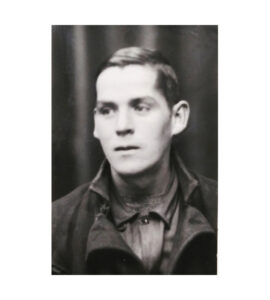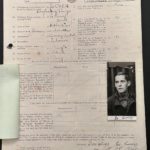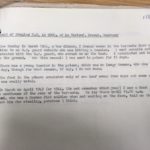Douglas Haig George Le Cocq
- Date of Birth: October 26, 1918
- Place of Birth: Guernsey
- Date of Deportation: March 1944
- Address when Deported: Somewhere in Alderney
- Place of deportation: Alderney
- Sites deported to: Alderney Gaol,
By Gilly Carr
Douglas Haig Le Cocq was born on 26 October 1918, making him 21 years old when the Germans occupied Guernsey. At the time of the registration of Islanders in October 1940, he lived at Le Variouf in the Forest parish. He was single and working as a labourer.
Le Cocq comes to our attention – not because of his minor infringement of German orders in December 1940, when he was found by the Feldgendarmerie to be ‘drunk on the road after the curfew hour’ – but because of his period of imprisonment in Alderney Goal in March 1944.
While the Frank Falla Archive does not usually record imprisonments in Alderney, it has made a small number of exceptions in order to show the precariousness of the existence of Islanders who worked on the farms in Alderney during the Occupation. If they got on the wrong side of the occupiers, they could find themselves imprisoned in Alderney Gaol or one of the labour camps in the Island. They were also witnesses to human rights abuses in the Island. Attempts by the Frank Falla Archive to contact authorities in Alderney today to study records of the prison has not yet resulted in any response. It is unknown – and probably unlikely – that any such prison records still survive, but this cannot yet be stated with any certainty.
Douglas Le Cocq testified to war crimes investigators after the war. This is what he said:
One Sunday in March 1944, after dinner, 2 French women in the barracks drew my attention to an OT guard outside who was hitting a Russian. I went outside and remonstrated with the OT guard, who struck me on the back. I retaliated and knocked him to the ground. For this assault I was sent to prison for 15 days.
There was a young Russian in the prison, which was on Longy Common, who was beaten every day, though for what reason, if any, I do not know.
The food in the prison consisted only of one loaf every four days and some coffee, which was really water.
In March or April 1943 (or 1944, I do not remember which year) I saw a dead Russian by the cookhouse at the rear of the barracks. He lay there until 11am. HANS, a shepherd, who was a German Flak soldier when not working on the farm, told me that he had shot him for stealing, potatoes I think.
[The National Archives ref. WO 311/12]
An additional testimony was sworn by another Islander who witnessed the following:
There was a Frontfuehrer over the O.T.s … He was about 40-50, 5’8”, thick-set, wearing horn-rimmed glasses. I am not sure I would recognise him again, but he is the man who was going to shoot an Englishmen named Le Cocq, for hitting an O.T. man who was hitting a Russian. He (Le Cocq) received 14 days in the O.T. prison by Newtown. This was a prison for foreign workers.
[Thomas Creron, 17 May 1945, Alderney, The National Archives WO 311/11]
The only further information we have about Douglas Le Cocq is that, by 4 July 1944, he was back in Guernsey and started working as a groundsman at Le Chêne in the Forest parish, Guernsey, for employer J. Laine.
The Frank Falla Archive would like to invite the family of Douglas Le Cocq to get in touch to share further information, family documents or photos.
Sources
Douglas Le Cocq’s Occupation registration form, Island Archives, Guernsey.
Douglas Le Cocq’s charge sheets, Island Archives, Guernsey, ref. CC14-05/21
Douglas Le Cocq’s testimony, The National Archives ref. WO 311/12.
Thomas Creron’s testimony, The National Archives ref. WO 311/11.
Map
- Cemetery / Mass Grave
- Concentration Camp
- Forced Labour Camp
- Prison
- Worksite / Fortification




